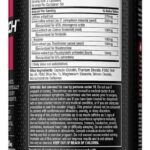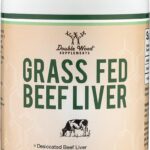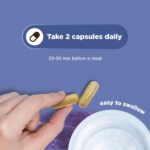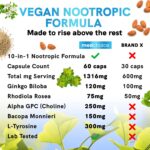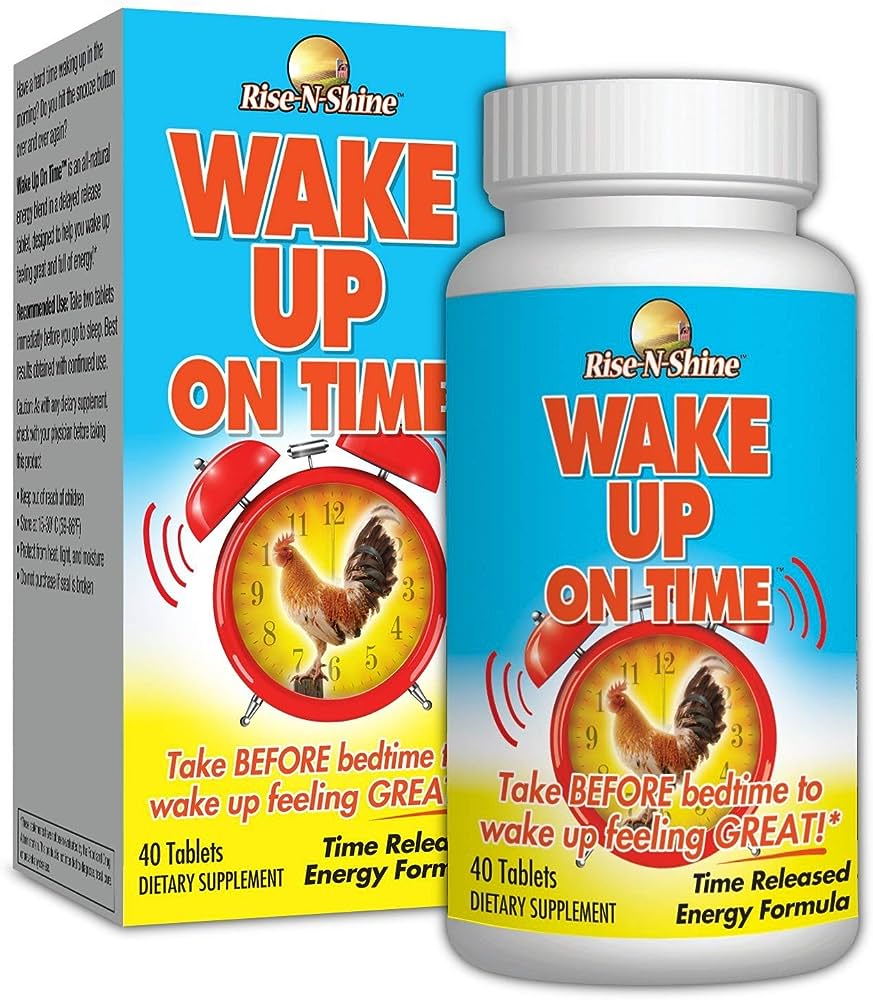Hey there! Have you ever wondered if there are natural alternatives to boost your brain power? Well, you’re in luck because today we’re going to dive into the world of natural nootropics. Nootropics, also known as smart drugs, are substances that enhance cognitive functions such as focus, memory, and creativity.
Now, when it comes to natural nootropics, you might be thinking, “Are there really any out there?” The answer is yes! While most people associate nootropics with synthetic compounds, there are actually plenty of natural options available. From herbs and spices to fruits and vegetables, Mother Nature has provided us with a variety of substances that can sharpen our mental abilities.
In our upcoming article, we’ll explore some of the most popular natural nootropics and how they can benefit your brain health. Whether you’re looking to improve your concentration, reduce brain fog, or enhance your memory, we’ve got you covered. Stay tuned for some valuable insights and practical tips on harnessing the power of natural nootropics.
What Are Nootropics?
Nootropics are substances that are believed to enhance cognitive function, improve memory and learning, and promote overall mental clarity. These compounds have gained popularity in recent years as people search for ways to boost their brain power and improve their mental well-being. While many nootropics are synthetic drugs or supplements, there is also a growing interest in natural alternatives that offer similar cognitive benefits without the potential side effects.
Definition of Nootropics
The term “nootropic” was coined in 1972 by Dr. Corneliu E. Giurgea, a Romanian psychologist and chemist. He defined nootropics as substances that enhance the brain’s ability to process and retain information, while also protecting it from damage caused by oxidative stress and other harmful factors. According to Dr. Giurgea, true nootropics should be completely safe and non-toxic, with little to no adverse effects.
Categories of Nootropics
Nootropics can be divided into several categories based on their mechanisms of action and chemical composition. Some of the most common categories include:
-
Racetams: This group of synthetic compounds includes popular nootropics such as piracetam and oxiracetam. Racetams are believed to enhance cognitive function by modulating the neurotransmitter receptors in the brain.
-
Cholinergics: Cholinergic nootropics work by increasing the levels of acetylcholine in the brain, a neurotransmitter involved in learning and memory. Examples of cholinergics include alpha-GPC and huperzine A.
-
Adaptogens: Adaptogenic nootropics are natural substances that help the body adapt to stress and restore balance. They work by regulating the body’s stress response system and supporting overall mental well-being. Common adaptogens used as nootropics include ashwagandha and rhodiola rosea.
-
Herbal Nootropics: These are natural plant extracts known for their cognitive-enhancing properties. Examples include ginkgo biloba, bacopa monnieri, and lion’s mane mushroom.
What Makes a Nootropic Natural?
Natural nootropics are substances derived from natural sources, such as plants or fungi, that have been traditionally used in traditional medicine systems for their cognitive-enhancing properties. These natural compounds are believed to offer similar benefits to synthetic nootropics, but without the potential side effects.
Criteria for Natural Nootropics
To be classified as a natural nootropic, a substance must meet certain criteria. Firstly, it should be derived from natural sources and be minimally processed to preserve its natural properties. Secondly, it should be safe for long-term use and have limited side effects. Lastly, it should have scientific evidence supporting its cognitive-enhancing effects.
Differentiating Natural and Synthetic Nootropics
While both natural and synthetic nootropics aim to enhance cognitive function, there are some key differences between the two. Synthetic nootropics are chemically engineered substances that have been created in a lab, whereas natural nootropics are derived from natural sources. Synthetic nootropics often require a prescription and may come with a higher risk of side effects, whereas natural nootropics are generally considered to be safer and more accessible.
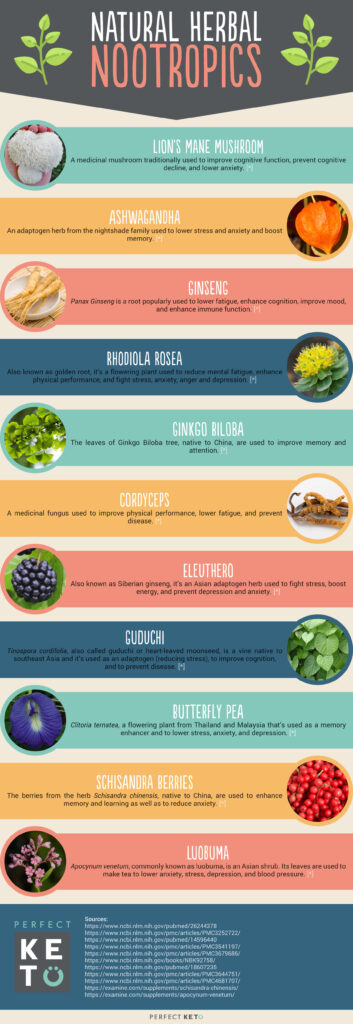
Examples of Natural Nootropics
There are several natural nootropics that have gained popularity for their cognitive-enhancing properties. Here are three examples:
Ginkgo Biloba
Ginkgo biloba is an ancient tree species native to China that has been used in traditional medicine for centuries. The leaves of the ginkgo biloba tree contain compounds called flavonoids and terpenoids, which are believed to improve memory, cognition, and overall mental performance. Ginkgo biloba has been shown to increase blood flow to the brain and may protect against oxidative stress and age-related cognitive decline.
Bacopa Monnieri
Bacopa monnieri, also known as brahmi, is a perennial herb native to India. It has been used in Ayurvedic medicine for its cognitive-enhancing properties. Bacopa monnieri contains compounds called bacosides, which are believed to improve memory and learning by promoting the growth of new nerve cells and enhancing the transmission of signals in the brain. Studies have shown that bacopa monnieri may also have anti-anxiety and antidepressant effects.
Lion’s Mane Mushroom
Lion’s mane mushroom, also known as Hericium erinaceus, is a medicinal mushroom that has been used in traditional Chinese medicine for centuries. It contains compounds called erinacines and hericenones, which have been shown to stimulate the production of nerve growth factors in the brain. These factors are essential for the survival and growth of neurons, and their enhancement may promote cognitive function, memory, and overall brain health.
Benefits of Natural Nootropics
Natural nootropics offer several potential benefits for cognitive health and mental well-being. Here are some of the key advantages:
Enhanced Cognitive Function
Natural nootropics are believed to enhance cognitive function, including focus, attention, and mental clarity. They may help improve information processing and boost overall cognitive performance, making it easier to concentrate and stay alert.
Improved Memory and Learning
Many natural nootropics have been shown to enhance memory and learning abilities. They may improve the brain’s ability to acquire, retain, and recall information, making it easier to learn new concepts and remember important details.
Reduced Anxiety and Stress
Certain natural nootropics, such as ashwagandha and bacopa monnieri, have adaptogenic properties that help the body adapt to stress and reduce anxiety. They may promote a sense of calm and relaxation, making it easier to cope with daily stressors and improve overall mental well-being.

Scientific Evidence on Natural Nootropics
While natural nootropics have a long history of traditional use, there is also a growing body of scientific research supporting their cognitive-enhancing effects.
Research Studies on Natural Nootropics
Numerous studies have been conducted to investigate the cognitive benefits of natural nootropics. For example, a systematic review published in the Journal of Ethnopharmacology in 2014 found that Ginkgo biloba extract improves cognitive function and daily living in patients with mild cognitive impairment and dementia. Another study, published in the Journal of Alternative and Complementary Medicine in 2016, found that Bacopa monnieri significantly improved memory, attention, and cognitive processing speed in healthy older adults.
Effectiveness and Safety
While natural nootropics have shown promising results in research studies, it is important to note that individual responses may vary. What works for one person may not work for another, and it is essential to find the right natural nootropic that suits your needs. Additionally, it is important to follow dosage recommendations and consult with a healthcare professional before starting any new supplement or medication.
How to Incorporate Natural Nootropics into Your Routine
If you’re interested in incorporating natural nootropics into your routine, here are some tips to consider:
Choosing and Sourcing Natural Nootropics
When selecting natural nootropics, it is essential to choose high-quality products from reputable sources. Ensure that the products have been tested for purity and are free from contaminants. It is also helpful to do thorough research on the specific natural nootropic you are considering to understand its potential benefits and side effects.
Dosage and Timing
Finding the right dosage and timing for natural nootropics is important to maximize their benefits. Start with a low dose and gradually increase it if needed. It is also helpful to take natural nootropics at the same time each day to establish a routine and maintain consistency.
Potential Side Effects
Most natural nootropics are considered safe for long-term use when taken at recommended dosages. However, it is important to be aware of potential side effects and monitor your body’s response. Common side effects may include gastrointestinal discomfort, headaches, or allergic reactions. If you experience any adverse effects, it is recommended to discontinue use and consult with a healthcare professional.
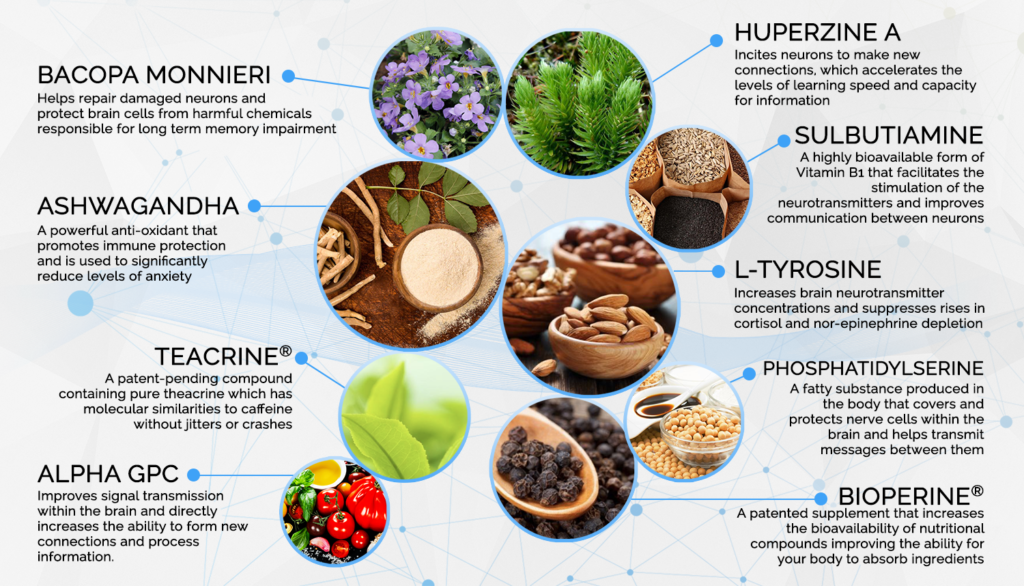
Combining Natural Nootropics with Other Cognitive Enhancement Methods
Natural nootropics can be complemented by other cognitive enhancement methods to further improve cognitive function and overall brain health.
Stacking Natural Nootropics with Synthetic Nootropics
Some individuals may choose to combine natural nootropics with synthetic nootropics for a synergistic effect. However, it is important to use caution when stacking substances and consult with a healthcare professional to ensure safety and avoid potential interactions.
Lifestyle Modifications for Optimal Cognitive Health
In addition to natural nootropics, lifestyle modifications can play a crucial role in optimizing cognitive health. Prioritizing quality sleep, engaging in regular physical exercise, maintaining a healthy diet, and managing stress levels are all important factors that can support cognitive function and overall mental well-being.
Natural Nootropics vs. Prescription Drugs
While natural nootropics have gained popularity as alternative cognitive enhancers, it is essential to understand the differences between these natural substances and prescription drugs.
Comparing Efficacy and Safety
Prescription drugs are often prescribed for specific medical conditions and have undergone extensive testing to assess their efficacy and safety. Natural nootropics, on the other hand, may not have the same level of regulatory scrutiny. While natural nootropics may offer cognitive benefits, their effects may vary, and scientific evidence may be limited.
Long-Term Effects
Long-term effects of natural nootropics are still being investigated, and more research is needed to fully understand their potential benefits and risks. Prescription drugs, on the other hand, have been studied extensively for their long-term effects.
Legality and Accessibility
Prescription drugs are strictly regulated and require a prescription from a healthcare professional. Natural nootropics, on the other hand, are generally available as over-the-counter supplements and can be purchased without a prescription. However, it is always important to ensure the legality of natural nootropics in your country or region.
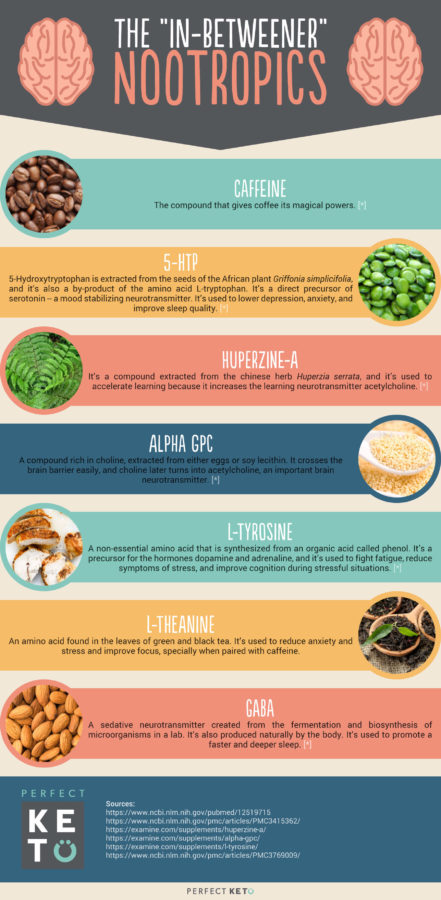
Common Myths and Misconceptions about Natural Nootropics
As with any topic, there are some common myths and misconceptions surrounding natural nootropics. Let’s address a couple of them:
Placebo Effect
Some skeptics argue that the cognitive benefits experienced from natural nootropics are simply due to the placebo effect. While the placebo effect can play a role in perceived benefits, scientific evidence supports the cognitive-enhancing properties of certain natural nootropics, indicating that their effects go beyond placebo.
Instant Results
Another misconception is that natural nootropics provide instant results. While some individuals may experience immediate benefits, it is important to note that natural nootropics may take time to accumulate in the body and produce noticeable effects. Consistency and patience are key when incorporating natural nootropics into your routine.
Conclusion
In conclusion, there are natural nootropics available that offer potential cognitive-enhancing benefits without the potential risks associated with synthetic drugs. Natural substances such as ginkgo biloba, bacopa monnieri, and lion’s mane mushroom have been used for centuries in traditional medicine systems and have shown promising results in scientific research. However, it is important to remember that individual responses may vary, and it is essential to choose high-quality products, follow recommended dosages, and consult with a healthcare professional when incorporating natural nootropics into your routine. By leveraging the power of natural nootropics along with a healthy lifestyle, you can potentially enhance cognitive function and improve your overall mental well-being.


